However, after speaking to him for a little over an hour it’s clear that this is quite the understatement. For a relatively young man, at just 36 years of age, Gwynne has experienced, and achieved, more than most can wish to in a lifetime.
While brought up in and around Brecon, Gwynne took an interest in mechanics in school and college before joining the Army at 18. He enlisted in 2004, joining the Royal Electrical and Mechanical Engineers (REME). He conducted his Phase 2 training in Bordon at the School of Electrical and Mechanical Engineering and qualified as a Vehicle Mechanic in 2005.
During his years of service, Gwynne was assigned to a number of units and has travelled all over the world.
“We saw some incredible places,” he said. “My first posting was in Germany, but I’ve also spent time in Canada - which is beautiful - and done six-month stints in Iraq (2008) and Afghanistan (2013) amongst others.”
Also in 2013, Gwynne was awarded promotion to Corporal and began a two-and-a-half year deployment in Cyprus, where he provided support to units in Iraq and Syria.
Gwynne went out to Cyprus with his wife Louise, and daughter Scarlett.
“They’re everything to me,” said Gwynne. “Lou and I met in 2006 in Brecon and got married four years later.
“It was hard work in Cyprus but the lifestyle was insane, seeing Scarlett (born 2011) growing up in the sunshine, dipping in and out of the pool, was great.”
It was during the family’s time in Cyprus when Gwynne’s life would change forever.
He explained: “I was in the gym - just like any other day - and I keeled over while squatting,
“I was doing nothing unusual but it just went - I had fractured my right hip and damaged the cartilage.”
Gwynne had surgery in Cyprus on his right hip, recovering from the operation in just 12 weeks. He was told by doctors that he would likely get arthritis in his hip at some point in his lifetime.
“The doctors warned me that I was basically guaranteed to get arthritis,” said Gwynne. “But we all thought it would happen years down the line. It was later discovered that I had early onset osteoarthritis.”
Gwynne left Cyprus with his family at the end of 2014, and became a Section Commander at MOD Lyneham in Wiltshire. In his role, Gwynne was responsible for training aiding the development of junior mechanics.
“I loved the role,” he said. “Seeing the lads through the phase two of their training was so rewarding. It’s more than just training - it’s about learning life skills and growing up.”
In 2017, Gwynne arrived at the 1st Battalion the Royal Regiment of Fusiliers. It was during this time that Gwynne received the results from an MRI on his left hip.
“The MRI showed damage so this led to surgery in May 2018, which unfortunately didn’t go as planned. I now had osteoarthritis in both hips as well as torn labrums.” (The cartilage which provides stability to the hip joint).
Doctors said that the injury had been caused by Gwynne overcompensating on the opposite side due to his original injury.
“Following the surgery - I woke up and immediately felt worse,” said Gwynne. “You know your own body.”
Gwynne had a year of rehab but the pressures of his injury took its toll on both his physical and mental condition.
“I never accepted the injury,” he said. “I didn’t leave the house for months and only spoke to my wife, daughter and doctors. I was angry that I wasn’t getting any better.”
It was after this setback that Gwynne was diagnosed with depression and anxiety. Struggling to come to terms with his condition, he lost a lot of confidence in himself and life became very difficult.
“I completely shut my self away from the rest of the world as I didn’t want people to see me as a disabled man,” he said. “The anxiety and depression coupled together were so bad it almost overtook the physical injury.”
It was a chance encounter with a former colleague that first helped to turn Gwynne’s life around.
Gwynne explained: “I was going to mandatory training courses and in a very bad state of mind. I used to put my headphones in and my hood up - because hiding myself away made me feel safer, I guess.
“Luckily, I was sat next to an RAF Fireman I was posted with in Cyprus - Charlie Dye - who was chatting to me and was shocked at how much I had changed.
“He started talking about the idea of signing up for the Invictus Games - at first I thought he was talking rubbish.”
Charlie persisted in his efforts with Gwynne, even going to the length of filling out the forms for him to sign up for the Games.
“I am so grateful to Charlie who marched me up to Tedworth House to put in the application,” said Gwynne. “It it wasn’t for him then I don’t know where I’d be today - it was probably the best decision of my life.”
After deliberation over which events to opt for, Gwynne decided on wheelchair basketball and archery.
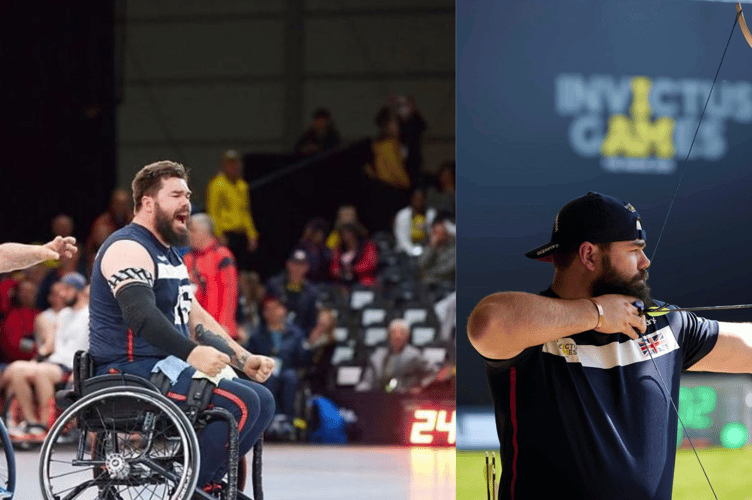
“I’ve always loved team sports,” said Gwynne. “I played for the Brecon rugby team, and continued to play during my military career - playing for the REME and was in the first XV for the army while serving in Germany.
“I love being part of a team - but chose archery too because I wanted to do something which is reliant on yourself. If you shoot a bad arrow it’s on you, and if you shoot a good arrow then that’s on you too.”
When Gwynne started his Invictus Games training, he says there was an ‘immediate shift’ in his wellbeing and recovery.
“It was a massive step to go to those first training camps, but once I got out of the car and joined in I was hooked on it,” he said.
“Wheelchair basketball gave me a new focus and I found this new sense of freedom in the chair.”
The trials for the Invictus Games took place in 2019, with the UK squad announcement coming in August that year.
“I didn’t think I would get in,” admitted Gwynne. “I was sat in my car in gridlocked traffic and I knew the announcement was coming that day. We were told we would get an email whether we were successful or unsuccessful.
“I saw this email pop up on my phone and at wasn’t sure if wanted to open it right away - I guess wasn’t sure if I was ready for the bad news. As were in at a complete standstill, I decided to open the email and it said was a congratulations messages - I had made the team. I had to read it three or four times to make sure.
“I started shouting in the car in celebration and banging the steering wheel - I must have been pretty animated because a woman next to me got out of her car and asked if I was okay!”
Following his success, Gwynne began taking part in training camps in August 2019, which took place every month up until the scheduled date for the Invictus Games - May 2020.
Gwynne said: “Scott Wallace is an incredible coach - he coaches a variety of levels and tailors his sessions to make sure it’s just right.”
Six weeks before the Invictus Games were meant to begin, the UK went into lockdown due to the COVID-19 pandemic. The games were first postponed to 2021 - which were later pushed back to April 2022.
“That was such a tough time,” explained Gwynne. “We had built ourselves up to this incredible event and put in so much work - it was so disappointing. On the other hand I got to spend more time with the incredible team and coaches.”
In November 2020, Gwynne was medically discharged from the army, a moment he describes as “incredibly difficult”
It had been my life since I was 18,” said Gwynne. “I had lost a part of my identity and I felt like a piece of me had been taken away.”
During the lockdowns, the teams had virtual training sessions where they would watch clips, analyse and discuss tactics - but the whole team couldn’t wait to be back out on the court again.
Gwynne explained: “Once Covid had settled down and clubs opened back up, I was unsure about joining up to play for a wheelchair basketball team. I’d wanted to do it for a while but I made various excuses - I was worried about being accepted and anxious about being around new people in new surroundings.
Gwynne credits Cardiff Met Archers coach, Rosie Williams, as being a huge driving force behind his wheelchair basketball journey.
“Rosie is probably the best motivator I have ever met in my life - she’s got so much positive energy,’ said Gwynne. “She was the person who encouraged me to come along to a session with the team.
“I remember being sat in the car before the first session for about half an hour - worried about meeting new people and whether they would accept me.
“Then Rosie came out looking for me - searching in all of the cars. She talked it over and helped me calm down, before walking me inside.
“She did that for a few weeks and I began to feel more comfortable in the new surroundings. I was looking forward to every Wednesday and playing as part of the team - I owe so much to her.”
“I have never looked back since. Being back in the chair with like-minded people, where there is no judgment, was amazing and helped to fill void that Invictus left during the pandemic.”
Fast forward to April 2022, and, after having been postponed twice, the fifth edition of the Invictus Games took play in The Hague Netherlands.
Gwynne took part in both the wheelchair basketball event and the archery - coming away with a bronze medal in basketball after the UK defeated Georgia on the final day of the games.
Gwynne said: “It was just an incredible experience. Help For Heroes paid for families to go over and watch the sports and it is something I will never forget.
“Lou and Scarlett absolutely loved it. Scarlett is my biggest fan in anything I do - she was named the best cheerleader for Team UK.
“The Invictus Games are so important. A lot of the competitors might not have injuries that are physically noticeable - some have PTSD and other conditions.
“It was good to see the Games on TV but it should be in the conversation more - mental health is still a taboo subject.”
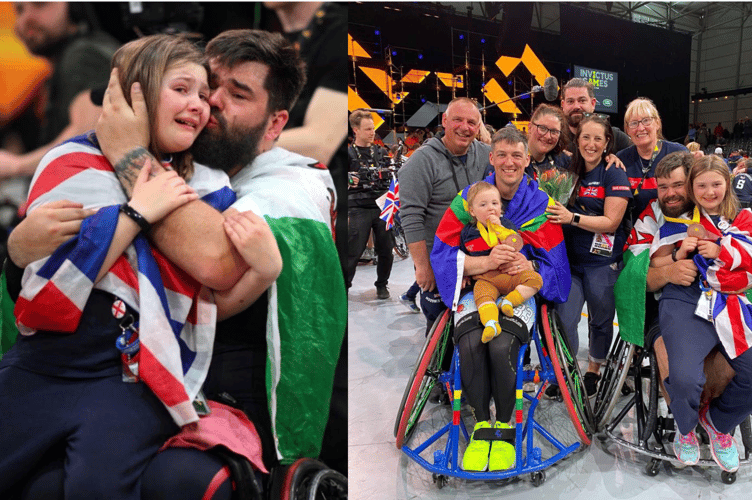
While competing in the Games, Gwynne took a moment to reflect live-on-air in the BBC studios with hosts JJ Chalmers and Alex Jones. He spoke candidly about his mental health battles, and said he wanted to take part in the games not just for himself, but because he doesn’t want anyone to face the struggles he has alone.
JJ, who is an ex-Royal Marine and Invictus Games medalist, chose Gwynne’s interview as one of his top three moments across the entirety of the Games.
“Since I spoke on the BBC, people have reached out to me and asked me where they can find help - which is massive,” said Gwynne.
“I’ll do anything I can do to help the conversation around mental health - if by telling my story I can help just one person or encourage someone to come forward for help - then it’s enough.”
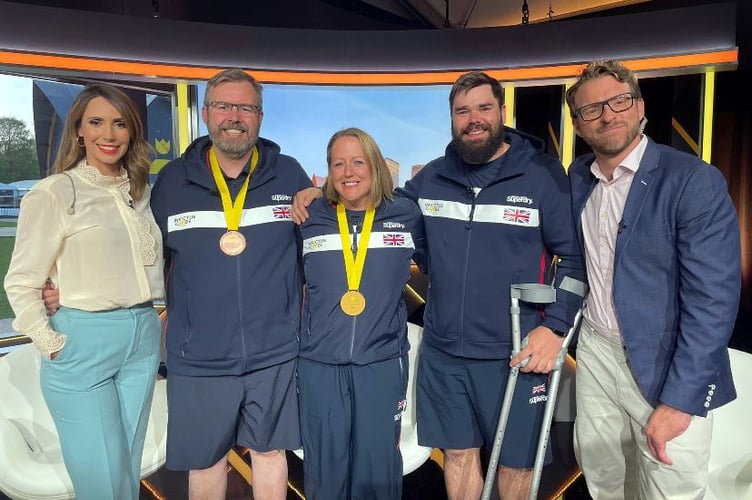
During the Invictus Games, Gwynne used a chair and a bow provided by Help For Heroes. He has since acquired his own bow so he can continue to take part in archery and is now on his way to securing his own wheelchair to play basketball.
While at the Games, Gwynne was told about SSAFA, the Armed Forces charity. The charity has been providing practical, emotional, and financial support to our Forces and their families since 1885 and not just during times of conflict. Their teams of volunteers and employees help those currently serving, veterans, and their families to retain their independence and dignity.
Through SSAFA’s grants process, and the local SSAFA branch is based in Brecon, Gwynne has been able to secure funding for a made-to-measure basketball wheelchair to be built. The wheelchair costs about £5,500 and will be funded by Help For Heroes, SSAFA, ABF The Soldiers’ Charity, and REME (Royal Electrical and Mechanical Engineers). Gwynne will also be self-funding £500 towards its cost.
“I’m getting fitted for it this month and it will take about six months to build,” he said. “I’ve got a pre-op for my first hip replacement in June and about eight weeks later it will be the same for the other one.
“It will be a long road to recovery and its all about preservation - but playing sports being able to do the little things will keep me driving forward.
“Wheelchair sports has aided my recovery like you wouldn’t believe - I can honestly say it has saved me.”


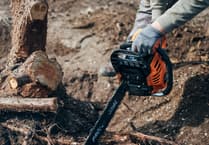
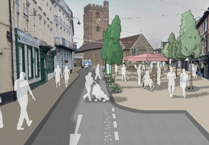

Comments
This article has no comments yet. Be the first to leave a comment.